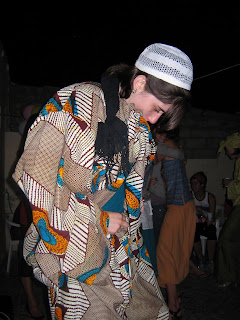
So class got out at six that day, and after a visit to the Ouakam Boulangerie for cream-filled beignets, I ran home to drop off my bag and get ready. Around 8 was waiting for Baird to come meet me at my house, and I had just gotten out of the bathroom, flushed the toilet and the power went out. For a moment, I considered the possibility that I had caused a power outage by flushing the toilet, and then stumbled down the hall back to my room. My phone has a flashlight on it, but it’s funny how you suddenly forget where you put things when you can no longer see where it might be. I fumbled around blindly for a few minutes and found it as Fatimata called down, “Alice, the power’s out! Come upstairs!” I pulled out a random tanktop, put it on backwards, took it off, put it on right side out and ran upstairs.
“Don’t run Alice! What if you fall on the tile?” Maman Ndiaye scolded. I’d made the mistake of telling her when my friend fell down the stairs and twisted her ankle a few days ago and now she is paranoid I’m going to meet the same fate. I’m no longer allowed to get anywhere faster than a crawl.
Upstairs they’d lit candles, and Maman Ndiaye was carrying around an oil lantern that was throwing monster shadows up on the cement walls. I reminded them that I was going to the Mardi Gras party. “Is that what you’re wearing?” Dibor asked. “Uh, I guess not?” “Are you going to go dressed as a boy?” Fatimata asked.
Apparently, Mardi Gras, like Muslim New Year are holidays that are celebrated by dressing up in outrageous costumes very similar to Halloween. One of the favorite costume ideas here is to dress as the opposite sex. I find this highly amusing in a country where homosexuality and cross-dressing outside of these specific social events is forbidden and even dangerous.
I explained that I didn’t have any boys clothes, and Maman Ndiaye immediately assured me, “Oh, Amadou will lend you some!” Amadou was sitting in the corner playing the snake game on his cell phone. She asks him about it in Wolof and after a minute he responded in French, “It’s for kids. Dressing up is for kids.” There was some arguing in Wolof. Then he said, “I’ll lend you something really good!”
Baird rings the doorbell, and I run down the two flights of stairs to answer it. When I get back up to the second floor, the whole family is waiting, and they have one of Amadou’s Senegalese Bubus (pronounced Boo-Boo). I held up a pair of giant clown-sized pants. I could have fit my whole body in one of the legs, but they were all chanting, “Put it on, put it on!” So it went over my jeans. Then came the tunic. The shirt fell to below my knees and was very much like wearing a brightly-colored tent. “You need a scarf!” Fatimata ran to her room and produced a black one to go around my neck. Maman Ndiaye emerged with a little white round hat and placed it on my head. They gave another one to Baird. “Today you change your look!” she beamed. He’d opted not to dress as a woman, but was wearing his Senegalese outfit and the tiny hat definitely completed the ensemble.
They all stood around complimenting us, ushered me in front of the mirror and held their candles up for me to look. Amadou was grinning. “I’ll lend it to you to wear on Friday sometime” he said. (on Fridays, the Muslim holy day, everyone wears traditional Senegalese dress). “No you won’t!” Fatimata interrupted, “That’s a boy’s outfit!” “But it’s really pretty!” he insisted, “It looks really good on her.” “Alice, don’t listen to him, it’s for boys, you can’t wear that on Friday!” She rolled her eyes. At this point, he turned to her and snapped something in Wolof and they continued arguing about it loudly until we were out the door.
We decided to taxi to the party because it was too far to walk and got one for 1000 francs CFA on the third try, which made us pretty proud. It helped that I let Baird (the Man) do all the haggling, and that he did it in Wolof. I like to think that our outfits were also a factor, but it was dark so that might just be me. Also, our taxi was brand new with seatbelts and a working odometer. It was crazy.

Baird and I in Senegalese dress..
*****
Yesterday evening (Ash Wednesday) we were eating dinner and someone asked me if I’d gone to mass that day. When I said no, there was some arguing in Wolof before Fatimata asked, “Aren’t you Catholic?” Pause. “Wait, are you Protestant? Protestants don’t believe in God, right?”
In general, the Senegalese are familiar with three religions: Islam, Animism and Catholicism. I know a lot of the other American students have been frustrated with Senegal’s ignorance of the different branches of Christianity; they tend to lump all Christians in as Catholics. For the most part, the Muslims and Catholics get along fine here, but being atheist or agnostic is really not okay.
“Why didn’t you go to mass today? You didn’t fast either? If you believe in God you have to do what he says!” they all scolded me.
I tried to explain about the different types of Christians again, and they sort of nodded, and seemed to accept that as a response. Oh, boy.